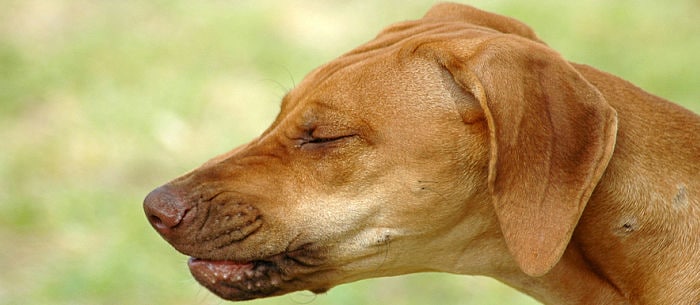Are you alarmed by the sound your dog makes when he sneezes? You might be witnessing “reverse sneezing,” a type of sneeze in which your dog is actually breathing in rather than breathing out.
“Most of the time, reverse sneezing is a more ‘dramatic’ process and therefore is often more alarming or concerning to owners,” explains Dr. Laura A Nafe, a veterinarian and an assistant professor at the Center for Veterinary Health Sciences at Oklahoma State University. Reverse sneezing in dogs may sound more like a snort than a typical sneeze, although it can be hard to differentiate between the two by sound alone.
Sneezing and reverse sneezing may also look different, since dogs tend to shake their heads when they sneeze, says Dr. David Haworth, a veterinarian and the president and CEO of the Morris Animal Foundation. During a reverse sneeze, however, the dog’s neck may stick straight out.
What causes reverse sneezing in dogs?
A reverse sneeze is usually the result of an irritation to a dog’s nasopharynx. In most cases, when your dog reverse sneezes, he is trying to clear his airway because something is irritating the area between his nostrils and lungs, says Dr. Haworth. The irritant could be anything from a piece of food that is stuck behind his soft palate to a grass seed stuck in his nose. Your dog could also be reverse sneezing because of a non-specific inflammation or — in rare cases — a polyp or tumor.
Has your dog always been a reverse sneezer? If your dog has chronic reverse sneezing, especially if she’s been experiencing it throughout her life, she may have structural changes in the back of her nose or throat region, says Dr. Nafe. According to Dr. Haworth, other dogs may have allergies that set off a slew of reverse sneezes. In very rare cases, this behavior could be a manifestation of epilepsy.
Should you worry about reverse sneezing?
Reverse sneezing on its own is usually not a health concern for your dog. This behavior “itself is not harmful,” says Dr. Nafe. “In other words, no dog is going to go into respiratory distress or not be provided adequate oxygen because of reverse sneezing alone.”
Sometimes, though — and only very rarely — reverse sneezing can be related to health issues regarding the nasopharynx. So it’s worth checking in with your vet. When to go? “It’s time to visit the veterinarian to get a definitive diagnosis,” says Dr. Haworth, when “the sneezing is scaring” you, your dog walker, or your dog. If your pet is having difficult eating or drinking, or seems to be showing respiratory or any other kind distress, you can ask your veterinarian to provide a full physical exam to determine whether or not there is cause to be concerned. Keep in mind, however, that this symptom is usually quite normal, and some dogs reverse sneeze on a regular basis.
Can you prevent reverse sneezes?
In most cases, you don’t need to prevent reverse sneezing. It’s a natural process, often used by dogs to remove dust or other irritants from their nasal passages. In some specific situations, however, you should prevent it.
For example, this may be the case for an older dog in a delicate health state that becomes overwhelmed by a series of reverse sneezes, or a dog that has recently undergone surgery. In these cases, Dr. Haworth suggests getting on the same level as the dog, speaking calmly and patting the pet’s fur to elicit a calming effect.
Unless your dog’s reverse sneezing is discovered to be related to epilepsy, in which case your vet might prescribe anti-epileptic drugs, there is usually no reason to give any additional treatment.
And check out Kennel Cough in Dogs: Everything You Need to Know.
Keren Perles is a freelance writer who specializes in writing about health and wellness, as well as parenting and education.
* This article is for general informational purposes only. It is not intended nor implied to be providing medical advice and is not a substitute for such advice. The reader should always consult a health care provider concerning any medical condition or treatment plan. Neither Care.com nor the author assumes any responsibility or liability with respect to use of any information contained herein.

